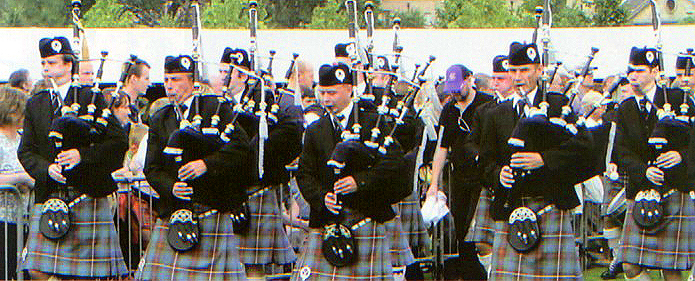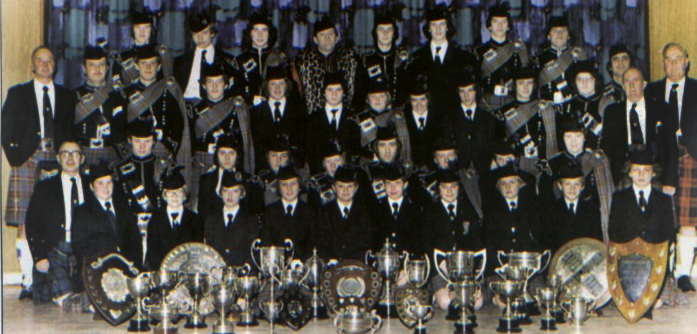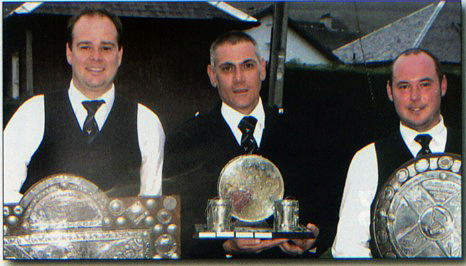 We continue with the interview that first appeared in Pipe Band magazine. P/M Walker tells of how he and leading drummer Gordon Brown learned to work together and how he got the consistently good tone which has become such a characteristic of his band, Boghall & Bathgate Caledonia….
We continue with the interview that first appeared in Pipe Band magazine. P/M Walker tells of how he and leading drummer Gordon Brown learned to work together and how he got the consistently good tone which has become such a characteristic of his band, Boghall & Bathgate Caledonia….
I think the biggest step Gordon and I took was probably about five years ago now. One of the classic difficulties in a pipe band is MSR playing, especially the march. The conversation will usually centre around tempo. Drummers have got to play it faster than pipers will want to play it. We butted our heads for a significant period of time. Gordon and I went through a period when we found it difficult to both be happy with the march playing and we argued about tempo, probably like a hundred bands around the globe. We got to a point where it was obvious we needed to do something as we were getting nowhere.

We sat in a classroom back in Blackburn on one November night and it was probably one of the most uncomfortable two and a half hours we’ve ever spent in each others’ company because it was no holds barred. It was everything on the table. But what I boiled it down to was when I am playing for him at the solo drumming it is fantastic because he plays his drum like a piper. What he was actually doing was phrasing his drumming to the way the piper plays the tune. This is one of the things that for me marks out a fantastic drummer. It just all matches and you can’t hear pipes and you can’t hear drums – you just hear this ensemble. I said to Gordon if we could get a drum corps sounding like ten of you then we would never argue about tempo again. What we actually realised was that we were talking about phrasing. That was five years ago. We’ve never argued about tempo since. It was a real ‘light bulb’ moment for us. We worked out a common language and the MSRs have just taken care of themselves since then.
[easyrotator]erc_14_1414056032[/easyrotator]People ask me a lot about our sound and I would advise anyone wishing to set up a band to gather as much experience as possible: watch others and listen. But the most critical thing you must have is a good reed, one that you can understand and work with. If you don’t have a good quality reed you are on a hiding to nothing straight away. Once you find a chanter and a reed combination that you like and can work with then stick with it and work with it and learn how to get the best from it. You won’t be able to do this overnight. The chanters we’ve been playing we’ve had for seven years now and I would be loath to change them because I know how they work and how to get the best out of them and the reeds that work with them.
In the main our pipers blow quite a strong reed but obviously everybody is different. But gone are the days when you would get a McAllister reed from Mr Martin and blow it for four weeks before you could actually play a 2/4 March from start to finish. That said the more robust a reed is the longer it will be stable so it is a false economy to play a reed that is too easy. The obvious time to put a new reed in would maybe be two or three months before the start of the season. But I’ll let you into a secret, the chanter reed I am playing is in its fourth season. If someone had said that to me five years ago I would have laughed in their face but if you get a good quality reed and you look after it why not? What do I mean by that? Don’t touch the blades. If I could say I have done anything with this reed of mine it would be that I never touch the blades. I wet it before I play it and I know people talk about the saliva will deteriorate the reed but I have got four full seasons out of old faithful and it still sounds great and I have never touched the blades with my fingers. I can’t remember if I did anything to it to get it to go initially but I certainly wouldn’t have cut it, if anything I might have just scraped the sound box a wee bit but not very much. The less you touch a reed the better. After that initial setting up period when you are working to get the reed free and vibrating and resonating there is frankly no need to touch the blades. I used to do that when I was growing up, heating the blades with the fingers. In my experience it just lessens its lifespan.
People ask me a lot about our sound and I would advise anyone wishing to set up a band to gather as much experience as possible: watch others and listen..
We made the move back to sheepskin probably about five years ago now, maybe longer. In fact it was a lot longer because I remember what made me go back to sheepskin. I listened to the recording of the 2001 World Championships. We were fourth that year and we had a really good sound. It was solid, there weren’t any dodgy notes. But listening to that and then some of the other bands changed my mind. I remember listening to SFU for example and the quality of sound they had from their instruments. The plastic stuff that we were playing would never achieve that and I would always be waiting on them having an off day before we could win. So that’s when the journey back to sheepskin began and it took us a couple of years to find our feet again. Of late we’ve started to go back to cane drone reeds so I would say that at the moment certainly well over half the band are playing cane drone reeds. I know sheepskin are expensive but it is worth it and actually some of the plastic bags and all the tubes never last the ten years you maybe expect. It actually works out pretty much the same. It was a bit of a fallacy saying that if we went back to sheepskin it would cost us a fortune. The difference was negligible to be honest. I mentioned SFU earlier but when I was younger and I was playing in the Grade 1 band we were going head to head with Strathclyde Police in the Ian MacLellan era so that quality of sound is always in the back of my mind. I do remember coming back from a contest and telling my dad we were second again to the ‘polis’.

They were a really good band but it was the sound that got them there and led to their run of success. I remember listening to Shotts in 2000. They didn’t have the sweet broad sound of the SFU but they had a wall of solid sound that impressed me as well. And the other band is obviously Field Marshal Montgomery at the moment because the sound they have achieved over the last decade has been outstanding. I have a professional respect for these bands and the others in Grade 1. Back in the band hall there are a few tricks you can use to get the guys fired up but the band world is fairly small and if you can’t respect each other, then it is not going to be much fun. There’s rivalry there, you want to beat your peers. But if they played well you’ve got to acknowledge it because if you play well you would like them to do the same to you.
[easyrotator]erc_75_1413484305[/easyrotator]We have won major titles and we have knocked on the door more times than we care for. Winning Cowal is always a special moment and I am delighted to have achieved that at least especially the first time which was relatively early on in my pipe majoring career with Boghall and it was relatively unexpected. We played very well that day when we won. We’d had a really good run at the Worlds two weeks before and maybe hadn’t got the result we perhaps deserved and I think we caught a little bit of momentum from the Worlds that year. The planets were in alignments for us that day so it was one that I will remember.

Over the years the bands that have impressed me and influenced me were FM from a couple of years ago. I think they played Moving Cloud as their introductory march and the clarity that they had in their sound was jaw-dropping. In recent times that has been one of the benchmarks against which you say ‘if you are going to be good, then that’s what good sounds like’. That’s one that is always going to be in my mind. When we were competing against Strathclyde Police in the 80s most of the band were just teenagers. You saw our drones moving and then you looked at these guys just standing there, solid, belting out this music. You can imagine the frustration of always being runners-up to them. You think ‘how do we beat them?’ But my mantra is be honest with yourself. If you can’t look in the mirror and recognise where you are deficient, what is wrong, how are you going to get any better? You need to be able to admit their drone sound is better, or their fingerwork is better. If you don’t you are not going to be able to fix it, you are not going to get any better.
Like to comment or send the Boggies a message of support? Use our comment section below.



















